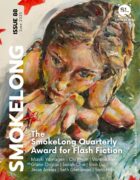Your story inspired me to look into Karen Carpenter. I probably watched the same “choppy looking internet video” that brings the narrator to tears. How much did Karen Carpenter inspire this story? Are you a Carpenters fan? What songs should we all listen to after reading this story?
I love the Carpenters. When I was a teenager, I learned about Karen Carpenter’s short life, and it made me very sad. The story here was born from a real moment in April. I was flying out of Las Vegas, but my afternoon flight got canceled, so I rebooked it to a redeye for that night in order to catch a close friend’s birthday party the following morning. I tried to sleep while on it, but I was woken up by a horrendous cover of “(They Long to Be) Close to You” playing on the intercom. It really happened. I suppose the haphazardness of that time in my life overall was what made for an equally haphazard story. I was going through a breakup, looking for a new job, and trying to not feel overwhelmed by all the news. That night, I just wanted to sleep. Not only was I denied that, but I had to hear one of my favorite songs get ruined, too? Weeks later, in my childhood bedroom, I wrote the story while listening to the Carpenters, “Long Season” by Fishmans, and Teresa Teng’s take on “The Moon Represents My Heart.” As a work of postmodern irony, “Gnarly” by Katseye complements the vulgarity of the story pretty well.
Throughout the story you capitalize certain words. This gives these words unexpected power. What sparked this decision? How did you choose which words to lend this power? What do you think this decision does to the story overall?
I was trying to copy what I had seen George Saunders, Lorrie Moore, and Thomas Pynchon do. I wanted to see what that capitalization did, and in my case, it was to exalt certain ideas on the page in an ugly, visually garish way. I didn’t have any rhyme or reason as to which words I capitalized, however. As I wrote, if I noticed a certain word vibrating or possessing a certain gravity to it, then I capitalized it without any further feeling and let it be. I never, ever touched it in revision.
This story is replete with longing. Even from the title, we understand there is something missing in the narrator’s life. The narrator mourns Karen Carpenter, but as he does so, he is also mourning the emptiness of his own life. This longing seems to be for meaning. The narrator says, “O, to be moved!” Is this the point of desire? To feel anything at all? How do we make meaning? Where can we go looking for it? Or does it have to surprise us?
In the manga and anime series Nana, Nana Osaki says that the pain which comes with a tattoo is what makes it worthwhile, because it reminds you that you’re alive. Likewise, Louise Erdrich says that we are all on earth to feel, to risk our hearts. There was once a time when I was indifferent and closed off to the world, but I eventually became more open, more understanding that I must be vulnerable in order to really live. Coincidentally, it was around that time when I got my first tattoo, which took five hours and hurt like hell. For me, as long as I’m feeling something, even awful things, then I can at least say that I’m alive. I would rather do that than be numb. Writing the story here was my way to show gratitude toward feeling, even if I didn’t have all the answers to everything about my life just yet.
This story begins and ends with family, a topic lost in the middle to corporate soullessness. The sections about the narrator’s family are vivid with detail: the sprained ankle and medical bills; the banh mi shop; the sky of “the most beautiful blue.” However, the narrator’s job is almost insistent in its vagueness: “Guy on Left-Hand Side of Live News Segment” and “Mr. Supervisor.” What brings focus and specificity to our lived experience? Love? Family? Connection? Music? Is real life in the details?
It’s whatever makes you really, truly pay attention. Right now, I’m living with my parents, spending time with them before I move again. Without intending for it, I found that much of my recent writing was concerned with the memories we have made as a family. It’s all so vivid, those memories. Of course, I feel the most alive whenever I’m with them, so it’s only inevitable that the stories derived from our time together are just as lucid and teeming with life.
Even though this story has tears and pain and people jumping off buildings, I found myself laughing out loud. The imminent economic crash is framed with humor, but the narrator is overcome by the life and death of Karen Carpenter. How are humor and tragedy intertwined? How do we laugh in the face of tragedy, or weep in the face of joy?
Going back to the redeye that inspired everything, I can remember laughing to myself that night. “Are you serious right now?” Likewise, whenever I listen to the Carpenters, I’m often reminded of the anguish behind their careers. It makes even a delightful song like “(They Long to Be) Close to You” sometimes impossible to listen to without crying. It’s a balancing act. I have to laugh amid tragedy to not fall into a despair from which there is no return. I have to cry amid joy to remind myself that there is still so much hurt all around which needs addressing. The story makes so many turns between comedy and tragedy to calibrate itself to a world which is so eccentric, so tonally Janus-faced. I think writing it was a way for me to make sense of things in my own life, too.



 The SmokeLong Grand Micro Contest (The Mikey) is now an annual competition celebrating and compensating the best micro fiction and nonfiction online.
The SmokeLong Grand Micro Contest (The Mikey) is now an annual competition celebrating and compensating the best micro fiction and nonfiction online.